“But love your enemies, do good, and lend, hoping for nothing in return; and your reward will be great, and you will be sons of the Most High. For He is kind to the unthankful and evil. Therefore be merciful, just as your Father also is merciful.” Luke 6:35-36
“Blessed are the merciful, for they will be shown mercy.” Matthew 5:7
What exactly is mercy? How to define it? I think Pope Francis said it best: “Jesus Christ is the face of mercy.”
But in many ways, so was His servant John. Here is one of my favorite saints.
Saint John the Merciful
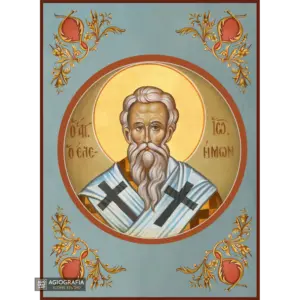
He is sometimes called “Saint John the Almsgiver”, making the same point that our Lord Jesus did above. Besides its “spiritual side”, mercy also has its “material side”. It involves giving, even lending, without expecting to get anything back. Being merciful sometimes results in great reward, a powerful response in return. Sometimes it does not, and that’s alright, too. Jesus Christ, for all His love and mercy, was not met with mercy, was He? He had His mind set on something higher, as did Saint John the Merciful.
John was born in Amathus, Cyprus, about the year 550, into a noble family. His Father Epiphanius was the governor of Cyprus.
Early in his life John married and had children *, but when they all died, he became a monk and devoted himself to prayer and study, expecting no more out of the rest of his life. He was not ordained.
- Some commentaries of monastic origin insist he did not want to marry, that he did so only to fulfill his father’s wishes, and that even after marriage his father had to push him into union with his bride so that they could have children. Personally I doubt that. He must have been a remarkable husband and father. Think how that loving, merciful man suffered, losing his family.
 Then Patriarch Theodorus of Alexandria died, and John (who was known because of his family connections) was chosen by Emperor Phocas to succeed him. He quickly passed through the stages of ordination and suddenly found himself the Forty-Eighth Patriarch of Alexandria, in succession to the Holy Apostle and Evangelist Mark.
Then Patriarch Theodorus of Alexandria died, and John (who was known because of his family connections) was chosen by Emperor Phocas to succeed him. He quickly passed through the stages of ordination and suddenly found himself the Forty-Eighth Patriarch of Alexandria, in succession to the Holy Apostle and Evangelist Mark.
I wonder if the Alexandrians knew what they were getting.

It was said that in his youth John had had a vision of a beautiful maiden with a garland of olives on her head, who said that she was Compassion, the eldest daughter of the Great King. This evidently made a deep impression on John’s mind.
The Patriarchate of Alexandria had immense wealth, both in money and in commercial enterprise, so John determined to use much of this wealth to help the poor. One of his first acts as Patriarch was to have a list made of several thousand needy people of the city, who were ever after welcome to what they needed out of the Patriarchate’s resources. John always referred to the poor as his “lords and masters”.
In his use of resources, he was guided by the rule of generosity, not of caution. A man who was not really in need applied for alms and was detected by the officers of the palace; but John merely said “Give to him; he might be Our Lord Jesus Christ in disguise”.
Patriarch John assisted people of every class who were in need. A shipwrecked merchant was thus helped three times, on the first two occasions apparently without doing him much good. The third time, however, John fitted him out with a ship and a cargo of wheat. By favorable winds he was taken as far as Britain where, as it turned out, there was a shortage of wheat, so not only were the British saved from famine, but the merchant obtained his own price, then returned to Alexandria and repaid the Patriarch!

His care was not limited to his own flock in Alexandria. When the Persians invaded Christian Palestine, sacked Jerusalem, and took many refugees * John sent innumerable convoys of supplies, food, wine, oil to the Palestinians, and welcomed many Palestinian refugees into Alexandria. The holy Patriarch John gave a large portion of the church treasury for the ransom of the refugees.

- Times don’t change much – except in the response to the suffering.
The Patriarch practiced mercy equally in his own life. Once he accepted a richly-embroidered blanket as a gift. Then, feeling guilty about it, he sold it and gave the proceeds to the needy. His benefactor discovered this and gave him another such blanket. John again gave it to the poor. His benefactor repeated the gift. John gave it away again. He was quoted as saying, “In this contest, we shall see who tires first!” It was not the Patriarch.
Once, as he and his attendants were traveling to a certain church, an old widow came up to him and spoke to him at length about her misfortunes. As the Patriarch listened to her attentively, his escorts kept urging him to hurry or they would be late for the service. John responded, “And how will God listen to me, if I do not listen to her?” He would not leave until he heard the widow’s complaint to the end.
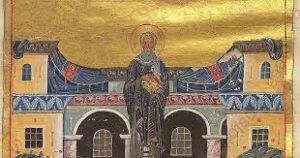
Patriarch John practiced the virtue of mercy in other ways. He visited the hospitals of Alexandria three times each week. He freed a great many slaves. Every Wednesday and Friday he “held court” so that any of the city who had problems of any sort could speak directly with him.
He was also a reformer who reorganized the system of weights and measures for the sake of the poor, and put a stop to corruption among the officials.
In his theology, though he didn’t make a lot of noise about it, Patriarch John was Orthodox, who accepted the Chalcedonian definition of Christ. He encouraged correct teaching, but dealt with the heterodox gently. * By the end of his Patriarchate the number of Orthodox churches in Alexandria increased tenfold, from seven to seventy.
- “You catch more flies with honey than with vinegar” is not a quotation from the Scriptures. However…
2Here is my favorite story about Saint John the Merciful, which I’m sure I’ve told you before: Once at Divine Liturgy, as he was about to enter the altar suddenly he remembered 1) that there was a priest in the city who had been at odds with him, with whom he had forgotten to try to make peace, and 2) Our Lord’s words: “Therefore if you bring your gift to the altar, and there remember that your brother has something against you, leave your gift there before the altar, and go your way. First be reconciled to your brother, and then come and offer your gift.” Matthew 5:23-24
So he stopped the ceremony and asked that the priest be brought to him – we can imagine the man’s trepidation – and there before the whole congregation Patriarch John knelt before his priest and begged his forgiveness. The priest was so overwhelmed by his Patriarch’s mercy that he then knelt before him and asked his forgiveness. Reconciled, the two exchanged the peace. And then the Patriarch entered the altar.
Another story of his unbounded beneficence: There was a time when a certain citizen insulted the Patriarch’s nephew George, who asked the Saint to avenge the wrong. The Saint promised to deal with the offender so that all of Alexandria would marvel at what he had done. This calmed George, and John began to instruct him, speaking of the need for meekness and humility. Then he summoned the man who insulted George. When Patriarch John learned that the man lived in a house owned by the church, he declared that as his punishment he would excuse him from paying rent for an entire year! Alexandria indeed was astonished by such a “revenge,” and George learned from his uncle how to forgive offenses and to bear insults, just as Christ did.
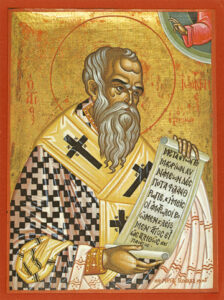
Patriarch John was a reformer who attacked simony, and fought heresy by means of improvements in religious education. He also reorganized the system of weights and measures for the sake of the poor, and put a stop to corruption among the officials.
In his theology, though he didn’t make a lot of noise about it, Patriarch John was Orthodox and accepted the Chalcedonian definition of Christ. However, he dealt with the heterodox gently, * and by the end of his Patriarchate the number of Orthodox churches in Alexandria had increased tenfold, from seven to seventy.
- “You catch more flies with honey than with vinegar” is not a quotation from the Scriptures. However…
John was always mindful of the salvation of his soul and of death. At the beginning of his years as Patriarch, he ordered a coffin for himself, but told the craftsmen not to finish it. Instead, he had them come each feast day and ask if it was time to finish the work. One day the time came.
Now the Persian invasion reached as far as Alexandria, and Patriarch John was encouraged to flee to the Emperor in Constantinople for safety. It was said that along the way he dreamed of a resplendent man who said to him, “The King of Kings summons you.” So instead he sailed to his native island of Cyprus, and at Amanthos Patriarch John of Alexcandria fell asleep peacefully in the Lord in his home town of Amathus, on November 11 in the year 619.
Sadly, not many years later, much of John’s work of reconciliation with the “Monophysite” Non-Chalcedonians of Egypt was undone by the violent persecution against them instituted by his successor Patriarch Cyrus, who combined both imperial and ecclesiastical authority as dual prefect and patriarch of Alexandria. To this day our Eastern Orthodox in Alexandria are a small minority.
The Patriarch’s body was taken to Constantinople, then before The City fell to the Turks, to Budapest, Hungary, and finally to Venice, where a church is dedicated to him, the Chiesa di San Giovanni Elemosinario, although his relics are preserved in another church, San Giovanni in Bragora, in a separate chapel.
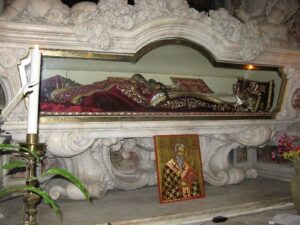
The chief source for John’s biography is a Life written by his contemporary, Leontios of Neapolis in Cyprus, who concluded: “Again this glorious man could not bear the thought that righteous and commendable achievements should come to an end with his brief life, so what did he do? He built from the foundations up hostels for strangers, asylums for the old, and monasteries, and he gathered together companies of holy monks and thus through the good works which are done therein he has won a memorial of his righteousness which shall never pass away.”
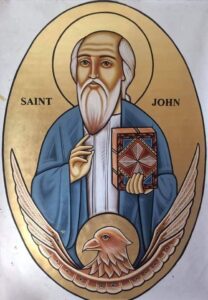
The following is portion of a commentary “Saint John the Merciful: Astonishing the world with love and mercy” by Roman Savchuk, written in Belarus in 2021.
“Many… worry about the implications of our choices for the good of society. We fear that by making concessions to evil, we might facilitate its multiplication. To justify our choices, we often say that we are not prepared to turn the left cheek if anyone slaps us on the right cheek. (Matthew 5: 39). Yet we often forget that the commandments of the Gospel also instruct us to give to the one who asks us and to hand over our coat to anyone who wants to sue us and take our shirt. (Matthew 5: 39, 40, 42). God gave us these commandments to save us from sin.
“In doing so, He did not seek to make our life on earth more comfortable, just or kind. Instead, He says to us, “You are the salt of the earth. You are the light of the world.” (Matthew 5: 13, 14). He emboldens us to bring to surprise the world by bringing in it something it has not known or experienced. We exist to astonish the world, not just to make it better. … With his humble life, Saint John teaches us to see the basis of the truth not in ourselves or our lofty goals, but in our Lord the Creator and His Word. By trusting His commandments and following them, we project more kindness and justice on others than by wielding the power of our minds and physical prowess.”
Articles consulted in writing this Post:
Orthodox Wiki: John the Merciful https://orthodoxwiki.org/John_the_Merciful
OCA: Saint John the Merciful, Patriarch of Alexandria https://www.oca.org/saints/lives/2000/11/12/103286-saint-john-the-merciful-patriarch-of-alexandria
Saint John the Merciful Resource Page: https://www.johnsanidopoulos.com/2017/11/saint-john-merciful-resource-page.html
Catholic Encyclopedia: New Advent: Saint John the Almsgiver https://www.newadvent.org/cathen/08486a.htm
The Life of John the Almsgiver, taken from Three Byzantine Saints: Contemporary Biographies of St. Daniel the Stylite, St. Theodore of Sykeon and St. John the Almsgiver, trans. Elizabeth Dawes, and introductions and notes by Norman H. Baynes, (London: 1948) https://sourcebooks.fordham.edu/basis/john-almsgiver.asp
The Blog of Saint Elisabeth Convent, Minsk, Belarus: https://obitel-minsk.org/en/saint-john-the-merciful-astonishing-the-world-with-love-and-mercy
Next Week’s Post: Fasting and Feasting and Fasting and Feasting
Week after Next: Prophets